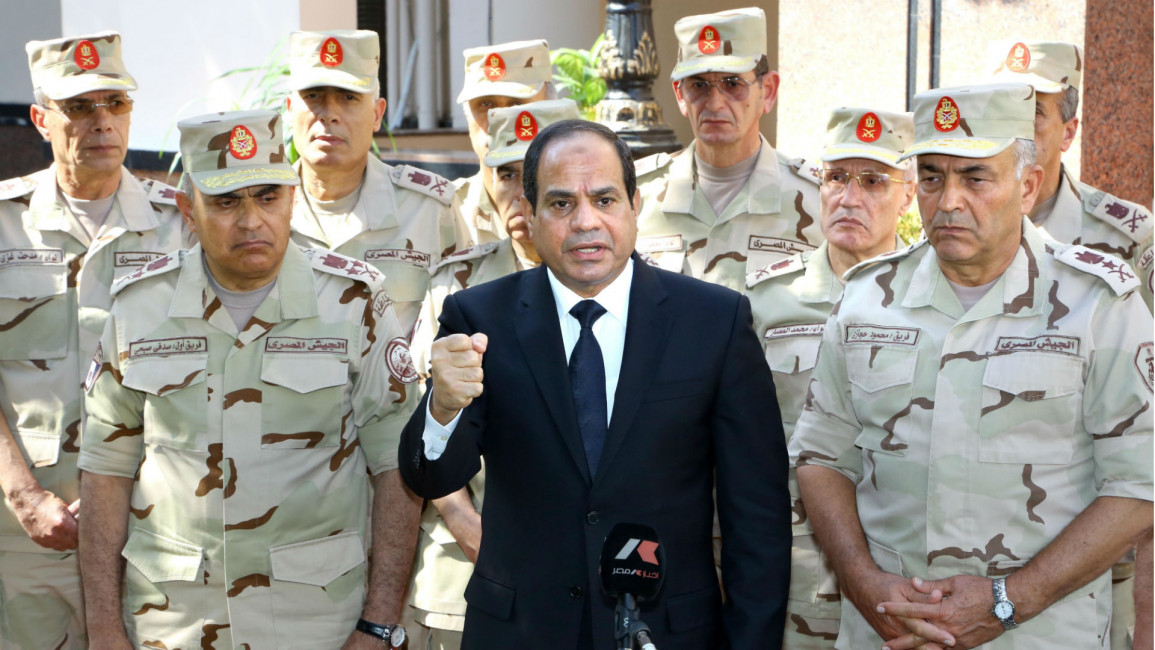Bomb blasts in Egypt amid crackdown on dissent
A bomb blast near Cairo University has wounded five police officers, while an explosion at a train station left four people injured in a panicked crush, Egyptian security officials said on Thursday.
Egypt has been hit by a wave of bombings and gun crime since the military overthrow of President Mohamed Morsi in July 2013.
The five police officers, including two senior officers, were wounded when a bomb exploded at a small police post near Helwan university in southern Cairo, security officials said.
In the Sharqiya province of the Nile Delta, three state transport buses were set on fire in separate attacks, the officials said, adding the buses were empty at the time.
| We are fully alert and aware that the aim is to bring this whole country down... God willing, this won't happen. - President Sisi |
Egypt is fighting an Islamist insurgency that has killed scores of police officers and soldiers, mostly in the restive Sinai peninsula.
The conflict is increasingly effecting local residents, most of whom are Bedouin. Egyptian security services recently destroyed homes along the border with Gaza after an attack on their forces.
The most prominent armed group in the area, Ansar Beit al-Maqdis, has pledged its allegiance to the Islamic State group in Iraq and Syria.
Ten people, including women and children, were killed on the peninsula earlier this week when a rocket struck their home.
"We are fully alert and aware that the aim is to bring this whole country down... God willing, this won't happen," President Abdel Fatteh al-Sisi said after an attack in October claimed the lives of 31 soldiers.
The government declared a state of emergency in parts of north Sinai and the security services are knocking down homes to create a buffer zone with the neighbouring Palestinian Gaza Strip.
Militant groups have also staged attacks in other parts of the country, including in Cairo.
There are a growing number of attacks on the public transport system. An explosion at a Cairo metro station left 16 people injured after panic swept the area on 13 November. A week earlier, on 6 November, a bomb on a train north of the capital killed two police officers and two passengers.
Still protesting
In addition to the violent insurrection, the Egyptian authorities continue to face peaceful resistance - despite a harsh crackdown on activists and journalists.
Security services arrested 48 protesters in a public demonstration on Wednesday near the famed Tahrir Square. Most of those present were reportedly not supporters of Islamist groups.
Such public gatherings have become rare since the highly restrictive anti-protest laws were enacted by the Sisi administration. The legislation bans all but police-sanctioned demonstrations.
| All artists need to be officially sanctioned and no songs criticising the authorities should be aired. |
Numerous human rights organisations have also been shut down or dissolved under the new administration.
The event in Tahrir Square was held to mark the third anniversary of the Mohammed Mahmoud Street battle in which nearly 50 protesters were killed in clashes with police that lasted six days. The battle became infamous as one of the most brutal acts of police aggression in the aftermath of the uprising that forced from power the autocratic president and military leader Hosni Mubarak.
The battle of Mohammed Mahmoud Street held particular significance because it marked a turning point of dissent in post-Morsi Egypt, as sections of the protest movement vowed to continue their uprising against the repressive arms of the state, while other groups withdrew from the streets.
Cultural dissent
Cultural deviation from the authorised narrative is also under continued attack.
Egyptian state radio has banned the songs of popular singer Hamza Namira from its airwaves because they criticise the authorities.
The performer rose to fame during the 2011 revolution with his protest songs of hope and freedom that he sang to huge crowds in Tahrir Square.
The head of the station said that all songs and artists need to be officially sanctioned and that no songs criticising the authorities should be aired.
One of Egypt's most successful actors, Khaled Abol Naga, has also come under fire for criticising the president. He has been accused of treason and a case is being filed against him for "disturbing national security".



